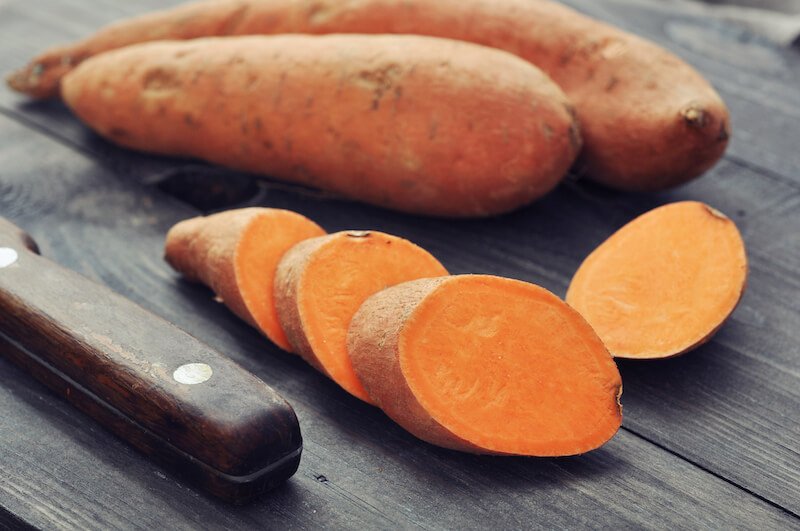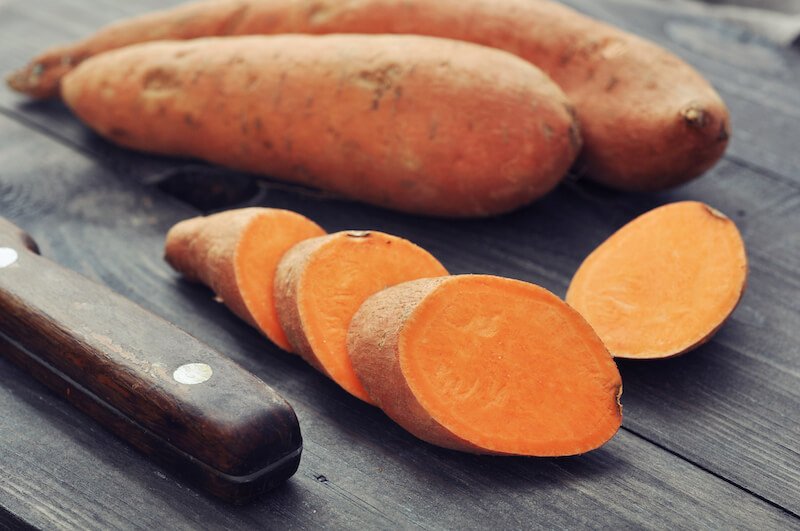Learn about brain health and nootropics to boost brain function
10 Proven Health Benefits of Sweet Potato


Whether you bake them to eat whole or make them into a pie, sweet potatoes offer a host of health benefits. These tasty tubers help everything from your belly to your heart.
While many associate the health benefits of sweet potato to those of the regular white potato, the two really can’t be compared. Sweet potatoes contain nearly ten times the amount of vitamin A found in a white potato, and they’re known to help battle inflammation and fight cancer.
Health Benefits of Sweet Potato
Sweet potatoes contain a ton of nutrients. While the name sounds deceiving, these root veggies won’t cause your blood sugar to go haywire.
Sweet potatoes are loaded with fiber, and contain plenty of vitamin A, C, and manganese. They’re also a great source of vitamin B6, potassium, copper, niacin, pantothenic acid and magnesium.
Here are 10 reasons you should start including more of these brightly-colored bulbs into your diet.
1. They Help You Manage Type 2 Diabetes
According to the Centers for Disease Control (CDC), more than 100 million Americans currently suffer from diabetes or prediabetes [1]. This is when your body becomes resistant to the effects of insulin. It can also occur when your body doesn’t produce enough of the substance. Insulin is a hormone that governs how your body metabolizes glucose, a form of sugar it uses as fuel.
Symptoms of Type 2 diabetes include:
- Frequent urination: When your body stops using sugar correctly, it tries to expel the excess through urine [2].
- Increased thirst: When you go to the restroom frequently, you grow thirsty as your body tries to replace lost fluids.
- Hunger: Because your body needs to metabolize sugar properly for fuel — but can’t — you feel famished. You don’t often lack calories, but rather nutrients. However, overeating leads to weight gain.
- Fatigue: Because your body isn’t getting much fuel, even when you eat a lot, you feel tired.
- Blurry vision: Diabetes hurts your eyes and can lead to blindness when left untreated.
- Infections: Your body has fewer nutrients available to fight germs, meaning you get sick more often. Women with Type 2 diabetes often experience frequent yeast infections.
- Slow-healing sores: Similar to infections, your body lacks the nutrients it needs to speed healing.
Despite their name, sweet potatoes won’t cause your blood sugar to rise dramatically when eaten in moderation. Purple sweet potatoes may prove especially beneficial. They contain anthocyanins, substances that reverse Type 2 diabetes and obesity by changing the way your gut absorbs carbohydrates [3].
2. They Can Decrease Cancer Risk
Did you know that 85% of breast cancer cases occur in people with no family history of the disease [4]? This strongly suggests that lifestyle factors, such as diet, influence your chances of developing this disease more than genetics.
Sweet potatoes contain high levels of vitamin A. Researchers evaluated the efficacy of foods rich in this vitamin for combating lung cancer. Study participants who regularly consumed sweet potato leaves significantly reduced their risk of developing this disease [5]. You can toss the leaves in with a salad to boost your intake.
The protein found in sweet potatoes also possesses special cancer-fighting properties. It turns out that over 80% of the protein in sweet potatoes is a type of protease inhibitor with potential anti-cancer effects.
These proteins have been tested against colorectal cancer cells, one of the most common and deadly cancers. Not only do these proteins slow down the growth of colon cancer cells, but they may also decrease cancer cell migration and invasion.
Most people remove the peels of their sweet potato. While you can certainly enrich your compost pile this way, you’re missing key nutritional benefits. Sweet potato peels contain antioxidants that fight cancer-causing free radicals in the body. Free radicals damage cellular DNA and eventually lead to mutation and cell death. Scientists implicate oxidative stress from these toxins in the development of various diseases, including multiple forms of cancer.
3. They Lower Your Blood Pressure
Sweet potatoes contain high levels of potassium and magnesium, two essential minerals that keep your heart healthy. Unlike regular spuds, you can fry sweet potatoes without raising the sodium or calorie count [6]. They make a delicious snack on their own or as a side dish with any meal.
The high potassium content in sweet potatoes helps your body cancel out the negative effects of salt. It aids your kidneys to function more efficiently so you can flush excess sodium from your body, lowering your blood pressure naturally.
Too much pressure on the veins puts stress on them. This increases your risk of stroke and congestive heart failure. Merely swapping out regular fries for sweet potato ones can make a big difference to your cardiovascular health.
4. They Decrease Inflammation
Many people today suffer from chronic inflammatory conditions such as rheumatoid arthritis and Crohn’s disease. Sweet potatoes contain choline, a natural anti-inflammatory compound that can ease the pain [7].
Purple sweet potatoes work best when it comes to fighting inflammation. You can mash them up for a colorful twist on a comfort classic [8]. Top them with low-calorie, low sodium toppings like salsa.
5. They Are Nutritional Powerhouses
You can find over 25 varieties of sweet potatoes at American grocery stores. All of these tasty tubers have unique phytonutrient profiles. However, they share many essential vitamins and minerals in common.
Just one sweet potato contains more than half your recommended dietary intake of Vitamin C. They supply more than a quarter of your daily vitamin B6 [9]. They even contain significant levels of protein — all in 180 tiny calories per tuber.
6. They Protect Your Eye Health
One sweet potato contains nearly 800 times the recommended daily allowance of vitamin A. This vitamin is essential for vision because it’s needed to form rhodopsin, a protein that absorbs light in the retina [10]. This improves your ability to see even in dimly-lit conditions.
Sweet potatoes also contain moderate levels of zinc, another important mineral for eye health. The Age-Related Eye Disease study evaluated the efficacy of zinc in preventing macular degeneration. They discovered eating foods high in the mineral significantly reduced the severity of age-related macular degeneration and warded off blindness resulting from the condition.
Try whipping up a vegan sweet potato casserole that combines the delicate flavor of these spuds with the nutty goodness of pecans. It makes a terrific alternative to marshmallow-laden holiday side dishes and pairs perfectly with cauliflower steaks or tofurky.
7. They Aid in Digestion
Sweet potatoes contain high levels of fiber. Fiber helps you maintain healthy body weight by making you feel fuller longer. Additionally, this substance draws water to your large intestine, lubricating your bowel movements and making them easier to pass. If you suffer frequent constipation, reach for one of these colorful roots.
The way you cook sweet potatoes influences the amount of fiber you consume. For maximum intake, try baking sweet potatoes as opposed to air frying them. You can drizzle them with a bit of olive oil for healthy fat and a bit of moisture. This method of preparation does increase the glycemic index slightly, but it’s still lower than a regular spud.
8. They May Boost Your Fertility
Vitamin A does much more than promote good eye health. It may boost your fertility as well. Deficiency in this nutrient can lead to secondary infertility in women of childbearing age [11].
Sweet potatoes also contain significant levels of iron. Women with iron-deficient anemia often develop infertility. The good news? By rectifying the underlying lack of this mineral, many women conceive within the first year.
Further research indicates that increasing the intake of this mineral may help stimulate the ovaries to release eggs. If you and your partner have struggled to get pregnant, try adding more sweet potatoes into your diet. Mix up some baked chips to eat instead of salty, store-bought crisps with no nutrient value.
9. They Promote Healthy Brain Function
Diets rich in fruits and vegetables like sweet potatoes result in a 13% lower risk of cognitive decline [12]. In addition to causing cancer, free radicals can damage cells in the neurological system. This includes your brain and spinal cord.
One study indicates combining cordyceps mushroom extract with sweet potatoes improved learning and memory in mice [13]. Try roasting these colorful tubers with mushrooms and marjoram for a brain-healthy treat before a big exam or work presentation. The mental boost you receive can help you excel.
10. They Support Your Immune System
Both vitamins A and C improve your immune system function. Vitamin A protects epithelium and mucus integrity in the body [14]. Your epithelium lines the outer surfaces of your internal organs, protecting them from infection. It makes up the top layer of your skin or epidermis — as a bonus, upping your intake of sweet spuds may leave your skin glowing and more radiant.
Your mucus carries infection from your body via your nasal passages and throat. Healthy levels of mucus help prevent germs from entering your body in the first place. If bugs do get past your defenses, increased mucus production helps flush them out more quickly, helping you feel better.
Your body needs vitamin C to heal and repair cells. Your body cannot manufacture this nutrient the way it can vitamin D, which requires adequate light exposure [15]. This means you need to consume it in foods or supplement form. Since supplements vary widely in quality, you’re better off getting an appropriate amount through your diet. Consuming additional vitamin C decreases the span of the average common cold by one and a half days in many people.
10 Solid Reasons to Eat More Sweet Potatoes
Whichever way you prepare them, sweet potatoes provide high levels of necessary nutrients. They benefit your overall health in multiple ways and can help you look and feel your best. Stock up next time you go to the farmers market and reap the various benefits.
Click here to view full article